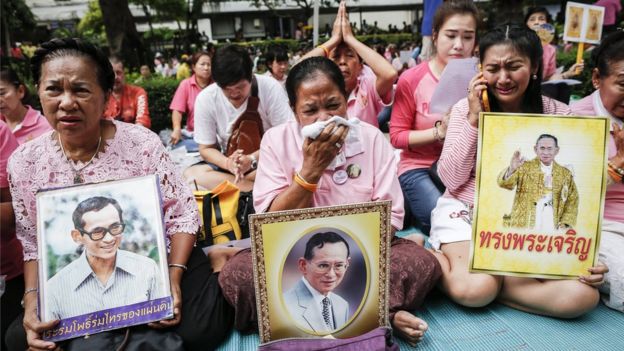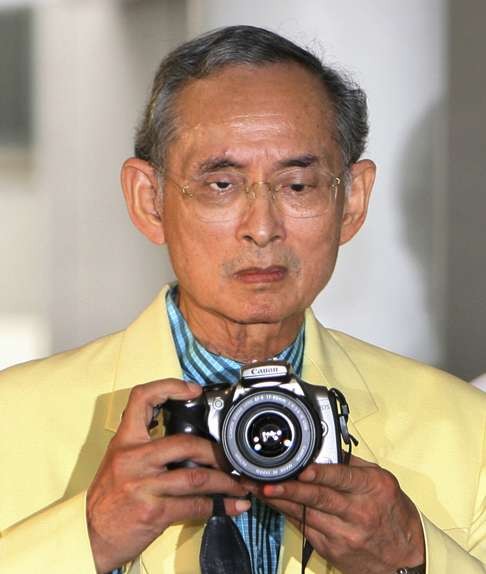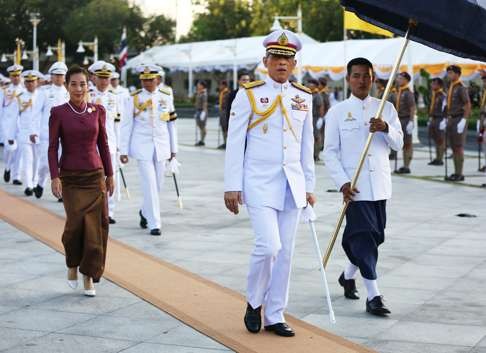
Thailand’s revered King Bhumibol Adulyadej has died at age 88.
King Bhumibol, the ninth king of the 234-year-old Chakri dynasty, died at the Siriraj Hospital in the capital Bangkok.
“His Majesty the King Bhumibol Adulyadej has died at the age of 88,” state broadcaster Thai Public Broadcasting Service posted on Twitter, with an image of the palace announcement.
Prior to his death Bhumibol had held the title of world’s longest reigning living monarch.
Thailand’s King Bhumibol Adulyadej takes a picture of his well wishers at Siriraj hospital in 2006. Photo: AFP
He had spent the bulk of his time in recent years in a dedicated royal wing in the facility following multiple age-related ailments including renal failure.
There is widespread expectation that his named successor, the 64-year-old Crown Prince Vajiralongkorn, will ascend to the throne.
Crown Prince Vajiralongkorn is expected to take the thrown. Photo: Post Today
Bhumibol was venerated as a sentinel of stability in a country that has seen some 20 coups – including 12 successful ones – in the past century.
The nation of 67 million people was plunged into mourning following the king’s death. Hundreds of people were gathered outside the hospital along the scenic Chao Phraya river as the government announcement was made.
Earlier, social media users in the kingdom changed their profile pictures to a template image that had the messages “Love the king”, “Long live the king” and their names inscribed on it. The image featured a yellow heart on a pink background.
“King Bhumibol Adulyadej will be remembered as Thailand’s longest reigning monarch,” said Patrick Jory, a historian at the University of Queensland focused on the history of the Thai monarchy.
“The end of King Bhumibol’s reign is the end of an era for Thailand, but also the start of a new one,” he said.
Market watchers said the Thai stock market and the baht would remain under pressure after sharp declines this week.
“In the aftermath of this sad event we are expecting investor nervousness to intensify due to political uncertainty,” said Jeffrey Halley, a Singapore-based senior market analyst with Oanda.
“Although the Thai baht and the SETI (Stock Exchange of Thailand Index) will remain under pressure, a lot of the uncertainty premium is already built into the price of both and thus losses will be limited from here,” he said.
Bhumibol ascended to the throne in 1946 after his elder brother King Ananda Mahidol died in a mysterious shooting.
Thai monarchy observers say the succession will be a seamless affair. Commentary from within Thailand about the king’s health and succession plans is scarce because of the country’s tough royal defamation laws, which have seen increased usage under the military government.
A Thai soldier walks next to a decorated portrait of Thai King Bhumibol Adulyadej outside Government House in Bangkok, Thailand, on Tuesday. Photo: EPA
“I believe it is cast in stone. There is no alternative to Vajiralongkorn,” said Serhat Unaldi, the author of a recent book about the Thai monarchy.
“According to the Palace Law of Succession, he is the rightful heir to the throne. Another choice as successor would have lacked legal legitimacy, but also the charismatic sources of royal power that are inherent in the blood of the successor and that the elite draws upon,” said Unaldi, the author of Working Towards the Monarchy: The Politics of Space in Downtown Bangkok.
Longtime Thai palace watcher Kevin Hewison said: “My view is that the prince will become king. I do not anticipate opposition.
Thai junta chief Prayuth abruptly cancels all official engagements to meet crown prince as king’s health fears grow
“The junta has made it clear enough that they are behind the prince,” said Hewison, referring to the current civilian rulers led by former army general Prayuth Chan-ocha, who seized power in 2014.
Tyrell Haberkorn, an Asian politics expert at the Australian National University, said the king’s death would be weighing heavily on the minds of both his supporters and detractors.
“For those who have been critical, or simply raised questions about the role of the institution of the monarchy in politics, the possibility of a transition, and uncertainty about whether or not it will bring even greater repression, is of primary concern,” she said.
Other experts said the death of Bhumibol could compel the junta to push back a general election it had said it would hold late next year.
Prayuth said in August he would push through with the plan after voters backed a new military-crafted constitution in a referendum.
The country has not had polls since 2011, and has been bitterly divided since the 2006 coup against then prime minister Thaksin Shinawatra, the billionaire telecom tycoon turned politician.
After the restoration of democracy, the military again intervened in 2014 to topple a government led by Thaksin’s sister Yingluck Shinawatra.
The Shinawatras are popular among Thailand’s north and northeast rural poor, but are opposed by the royalist elite.
Hewison said in the event of the king’s death, the military would “postpone the promised election next year”.
Thailand’s ‘day of reckoning’ delayed? Junta has delivered stability but critics warn fundamental problems remain
Jory said the military rulers were likely to remain in power during the mourning period and until the royal succession was completed “in order to guarantee political stability”.
He added: “The test will come when Thailand returns to civilian rule and the ban on political activities is lifted”.
Halley, the Singapore-based market analyst, said the Thai central bank would “be ready to step in to smooth any disorderly currency moves”.
“The military government will extend its tenure by at least a year to ensure a measure of political stability [and] this will give support to the SETI once the initial knee-jerk moves have worked through the system,” he said.


